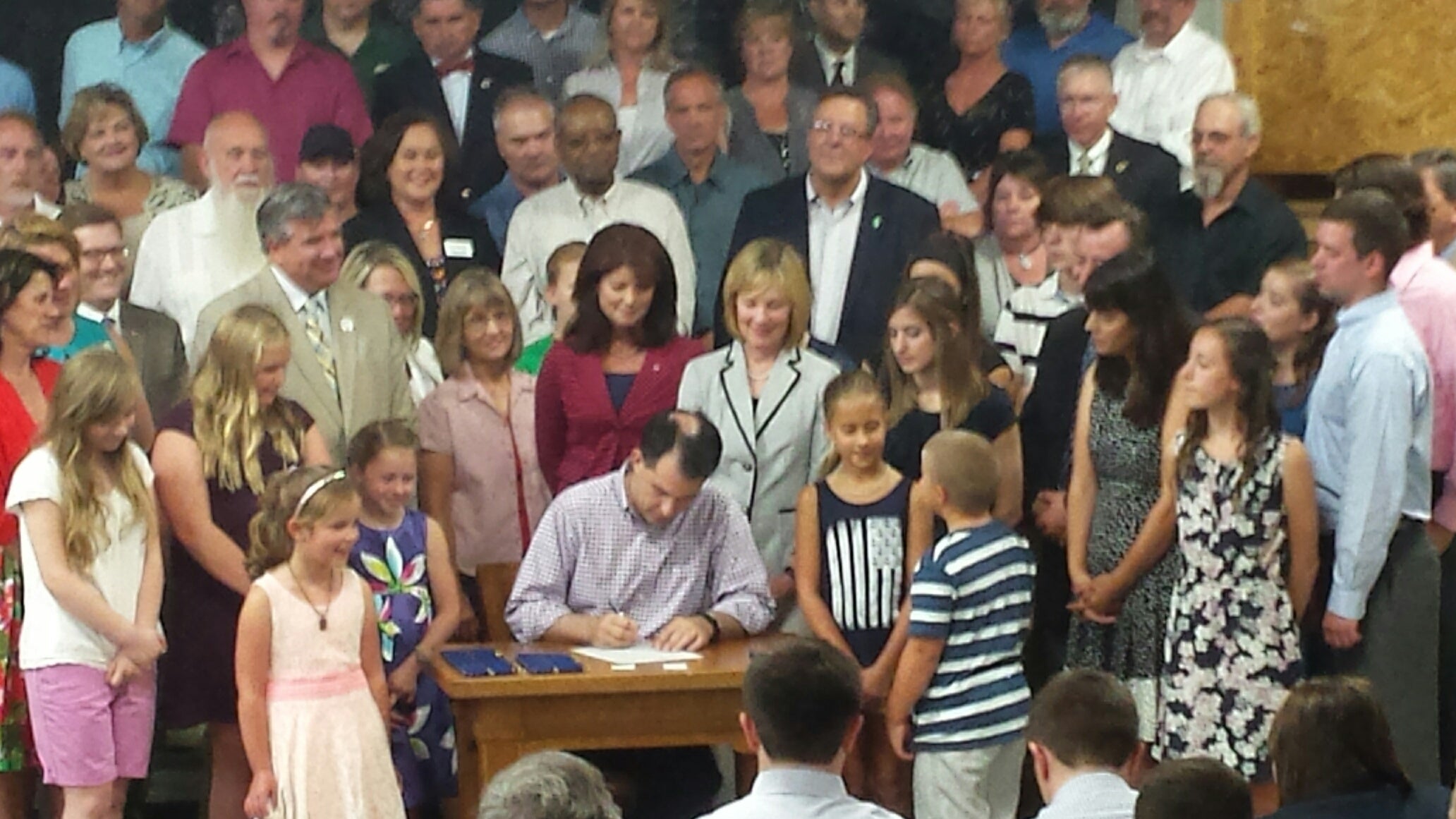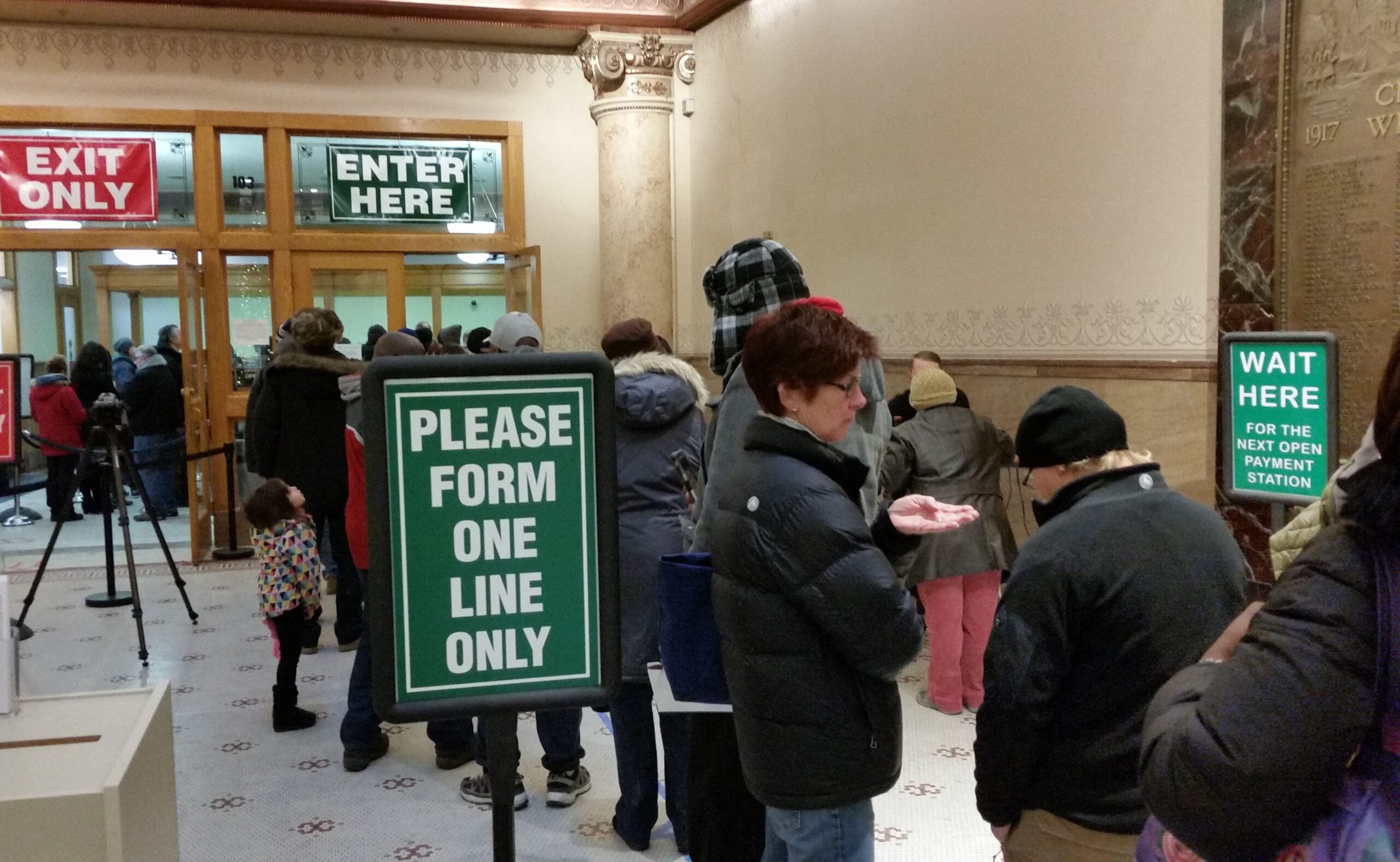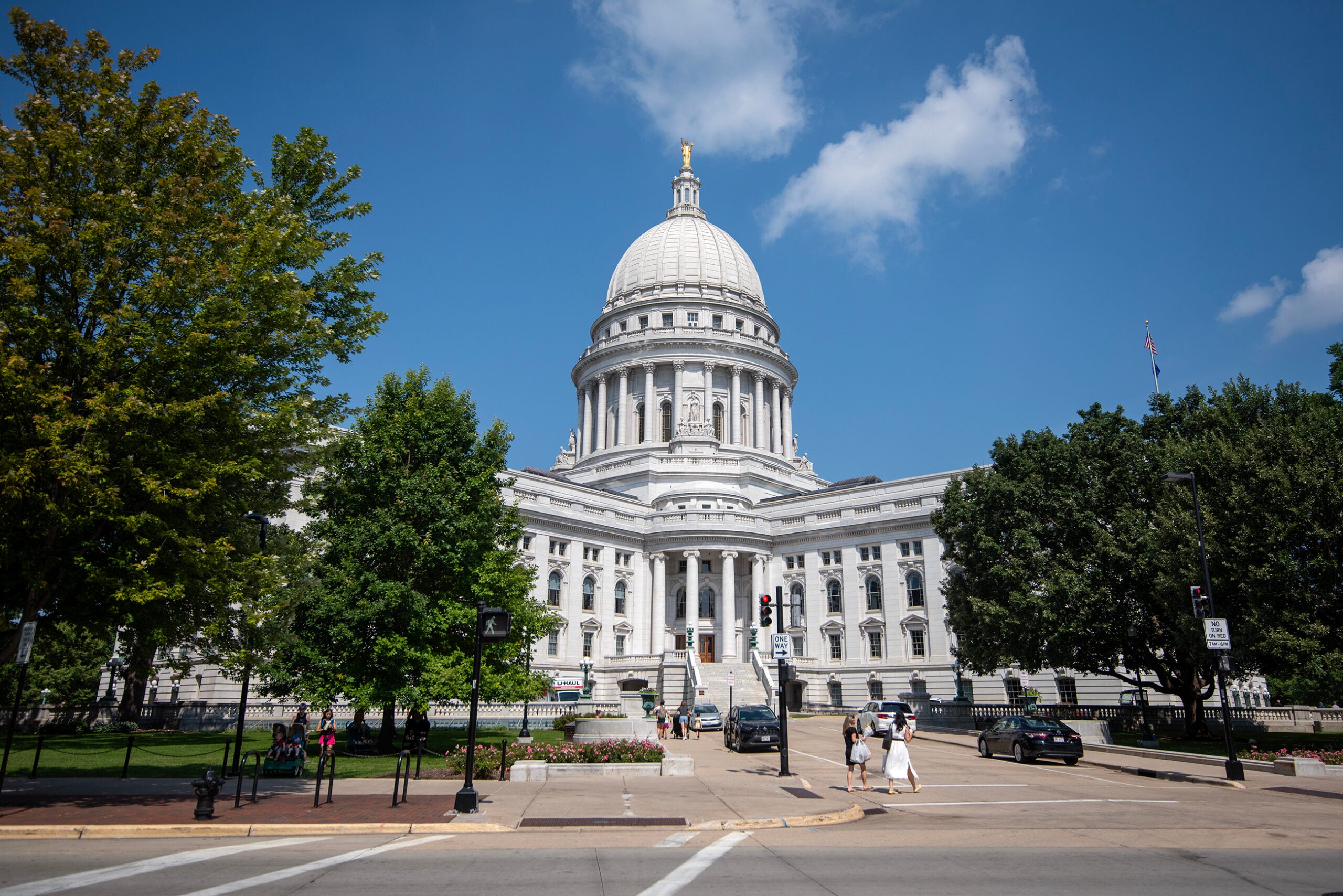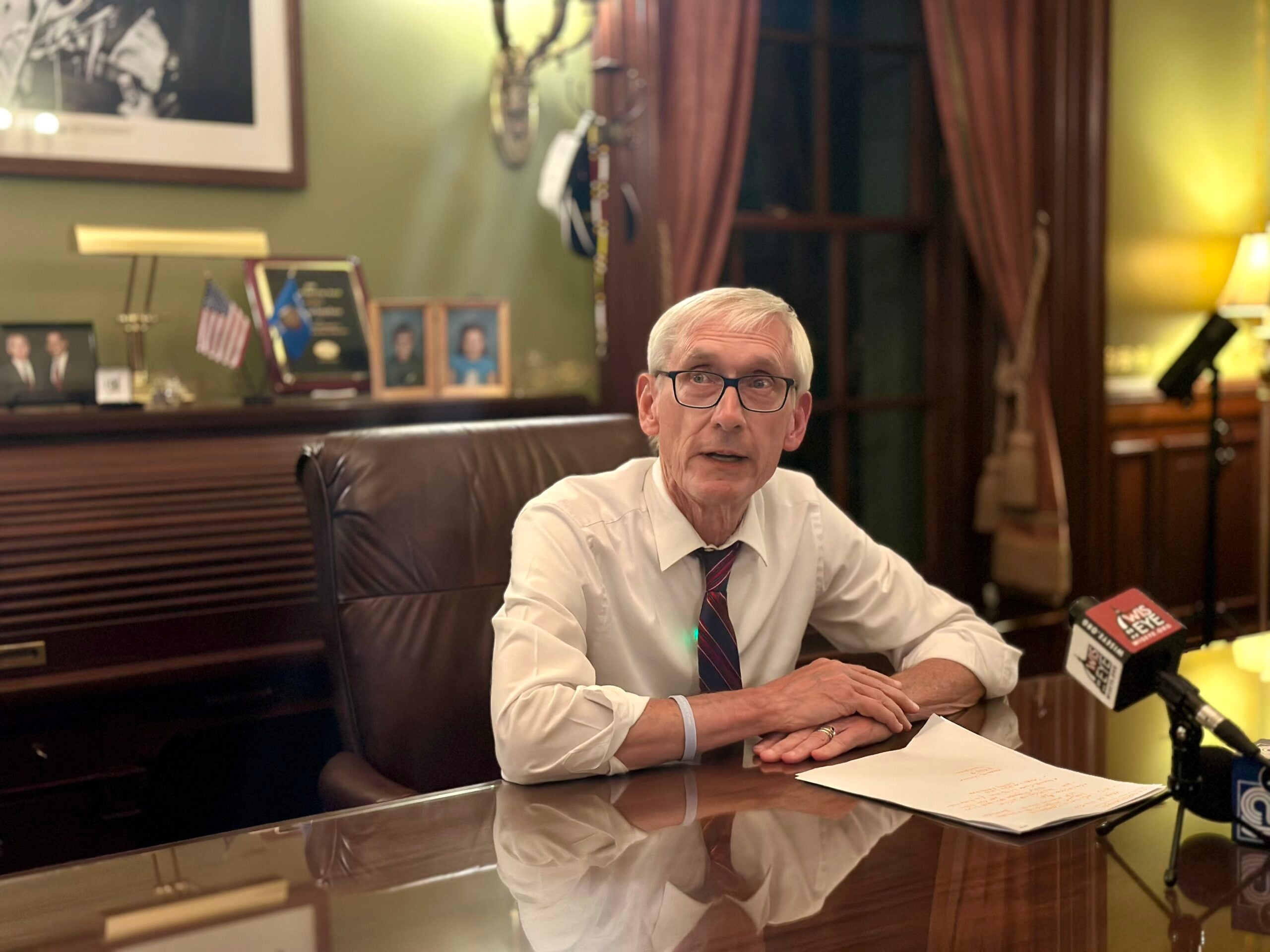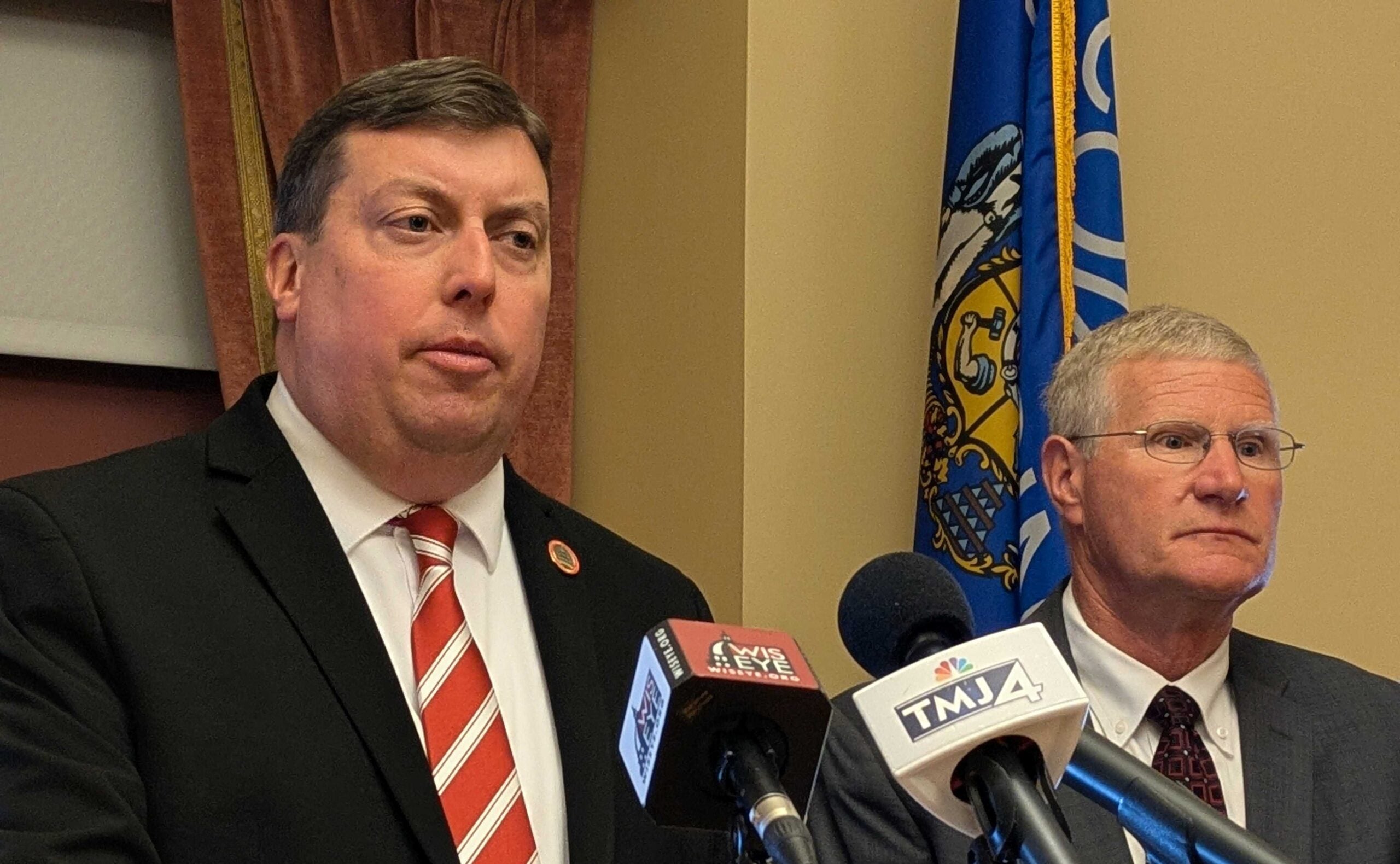Gov. Scott Walker signed the next two-year state budget on Sunday afternoon, just a day before he’s expected to announce his bid for the Republican nomination for president.
The $73 billion two-year spending plan emerged from the Republican-controlled state Legislature late last week after lengthy deliberations.
The governor made 104 vetoes to Wisconsin’s budget, but didn’t talk about them during his brief speech at a Valveworks USA, a manufacturing firm in Waukesha. Instead, the governor tried to put the focus on what’s in the budget, including language that he said will lead many to see more property tax cuts.
News with a little more humanity
WPR’s “Wisconsin Today” newsletter keeps you connected to the state you love without feeling overwhelmed. No paywall. No agenda. No corporate filter.
“For the fifth and sixth year in a row, property taxes on a typical home will go down in the state of Wisconsin,” said Walker. “Where else in the country has that happened?”
Some of the 104 vetoes caught Republican state lawmakers by surprise, and Democrats say overall, the budget contains too many surprises.
Republican legislative leaders Scott Fitzgerald and Robin Vos weren’t at the bill signing, several other lawmakers avoided the media after Walker’s speech, but state Sen. Alberta Darling, R-River Hills, came over to talk with the news media. The co-chair of the Legislature’s budget-writing committee said she didn’t know what Walker vetoed.
“You know, I have not had a chance to review the vetoes,” Darling said. “I could have, but I didn’t think there was much I was going to do about it right now, because this is the governor’s job is to veto what he thinks is not appropriate.”
The highlights include:
· Dumping a plan to expand the payday loan industry
· Reducing an attack on the Citizens Utility Board
· Adjusting changes to the Family Care and IRIS programs to add more control for the state Department of Health Services
· Giving the state Department of Natural Resources more control over education and science staff layoffs
(Specific veto information is on the Wisconsin Department of Administration website.)
But Walker didn’t drop major cuts to the University of Wisconsin System. He also kept an expansion of school vouchers, changes in the prevailing wage law and a long list of other controversial items.
State Rep. Peter Barca, D-Kenosha, the leader of the Assembly Democrats, placed education at the top of his list of concerns.
“The budget sells out of children for vouchers schools, $600 to $800 million over the years, sucked away to private schools,” Barca said.
Democrats say another problem with the budget is the way that Republicans added many items without much notice or public hearings.
State Rep. JoCasta Zamarripa, D-Milwaukee, said that’s the case with a plan that could allow a takeover of low-performing schools in her city.
“This seismic change was added in the middle of the night by the Joint Finance Committee without appropriate review or scrutiny,” she said.
The Joint Finance Committee also made late changes to the budget with the so-called 999 motion that made dozens of modifications.
State Rep. Samantha Kerkman, R-Salem, said when Democrats controlled the Legislature, they did the same thing.
“There’s always been a 999 that comes in at the last hour of the state budget process,” she said.
But, the number of modifications went up this year, and Kerkman said the 999 motions might merit a closer look.
Darling sounds more firmly in favor of ending the practice.
“I would like to not have that as part of our budget because we say bring it to the finance committee to debate it,” she said.
Walker is about to focus on a lot on other states. Following Monday afternoon’s presidential campaign kickoff, the governor will spend the rest of the week in Nevada, South Carolina, Georgia, New Hampshire and Iowa. Democrats say the Wisconsin state budget is more like Walker’s campaign document.
Here are some ways the budget could affect Wisconsin residents:
SCHOOLS
Public school funding: It won’t be cut by $127 million as Walker proposed, but there won’t be much more money. Funding will be flat the first year of the budget and go up by about $69 million in the second year, but schools aren’t being given the authority to increase spending. That means if a district does get more aid, it will have to divert it to lowering property taxes unless voters approve a special referendum.
Vouchers: More students who meet income qualifications will be able to attend private voucher schools because the current 1,000-student statewide enrollment cap changes to no more than 1 percent of a district’s total students. That will increase 1 percentage point a year for 10 years until there is no cap. Money to pay for voucher students will come out of public school aid. Also, students with disabilities who are denied open enrollment in another public school district will be able to use a voucher for private schools.
School Ratings: A new five-star system will have no sanctions for poor performers. Federal law currently requires schools to take the same standardized test, but Wisconsin will seek a waiver to allow for schools to choose between three and five standardized tests to measure performance.
Civics test: Starting in the 2016 school year, high school students will have to correctly answer at least 60 of the 100 questions on a civics exam before graduation. They could retake the test until they pass.
Sports: Home-schooled students will be able to play sports and participate in extracurricular activities at their local public school.
Milwaukee schools: The worst-performing Milwaukee Public Schools could be converted into independent charter or private voucher schools under control of a commissioner appointed by the county executive.
TRANSPORTATION
The state will borrow $850 million for road projects, down from Walker’s $1.3 billion proposal. That will mean delays in major highway projects and resurfacing and reconstruction work.
TAXES
The budget makes a number of changes to state taxes, including increasing the standard deduction for married couples filing jointly by $550, delaying the full phase-in of an income tax credit benefiting manufacturers and farmers, reducing the alternative minimum tax, allowing teachers to deduct up to $250 a year for classroom expenses and reducing taxes on hard cider. Property taxes will be held basically flat, and there are no increases in sales or income taxes.
PREVAILING WAGE
The law that sets a minimum salary for construction workers on public projects like road building and schools will be repealed for local governments but remain for state projects.
On rolling back parts of the prevailing wage rules, Walker said: “We made it easier for local governments, particularly for school boards and for technical college districts and other local governments, who had tipped the members of Legislature, for giving us the prevailing wage reform, to lift that burden so that construction costs will go down for local governments in the state of Wisconsin going forward.”
LONG-TERM CARE
Family Care and IRIS programs that strive to keep elderly people and those with disabilities out of nursing homes could be reshaped under budget provisions to allow for-profit managed care organizations to compete with networks of nonprofit groups that currently provide long-term care and ordinary medical care if the state gets federal approval.
DRUG TESTS
Recipients of public aid programs such as food stamps and unemployment benefits will have to undergo initial screenings for drug use and could be subjected to drug tests later.
UNIVERSITY OF WISCONSIN
The university system’s budget will be cut by $250 million and make it easier to fire tenured faculty. Also, faculty will have less of a role in making decisions. In-state tuition will be frozen over the next two years.
NATURAL RESOURCES
Fees for Wisconsin state parks will go up by $3 for annual admission and by $1 for daily admission. Camping fees for residents will increase $3 to $5 per night depending on a site’s popularity; out-of-staters will pay an extra $5 to $8. The cost of an annual trail pass will go up $5. The fee increases will help offset the end of tax support for state parks.
There may be more places to backpack, ski or snowshoe. The budget committee authorized the state’s stewardship program to borrow $9 million per year for land acquisition. That’s down dramatically from $19.3 million next year and $22.2 million in each of the following fiscal years through 2020, however.
The budget cuts 17.5 researcher positions from the Department of Natural Resources’ Sciences Services Bureau, which has worked on issues such as pollution and mining. The bureau will have 12.85 researcher positions left.
About half-a-dozen nonprofit conservation organizations won’t get about $1 million in grants after the governor vetoed the money out of the budget.
ECONOMIC DEVELOPMENT
Republicans eliminated Walker’s plan to provide $55 million in Wisconsin Economic Development Corp. grants to regional groups for loans to businesses after a series of audits found WEDC has failed to track past-due loans, failed to follow state contract law and hasn’t demanded proof from grant and loan recipients that they’ve created jobs.
PRISONS
Prison towers will stand empty during the night, as 60 third-shift tower guard positions across 10 prisons will be eliminated, saving nearly $6 million. Those employees will be moved into other vacancies.
OIL PIPELINE
Counties couldn’t force companies that are building oil pipelines to purchase additional insurance, a provision that will help Canada-based Enbridge Energy finish work on an expansion that has been held up for months in Dane County.
SEVEN-DAY WORK WEEK
Factory and retail employees will be allowed to volunteer to work seven straight days, a change from current state law that says those workers must get at least 24 consecutive hours of rest for every seven-day stretch.
Editor’s note: this story has been updated to include a quote form Gov. Scott Walker on prevailing wage changes in the budget.
Wisconsin Public Radio, © Copyright 2025, Board of Regents of the University of Wisconsin System and Wisconsin Educational Communications Board.

